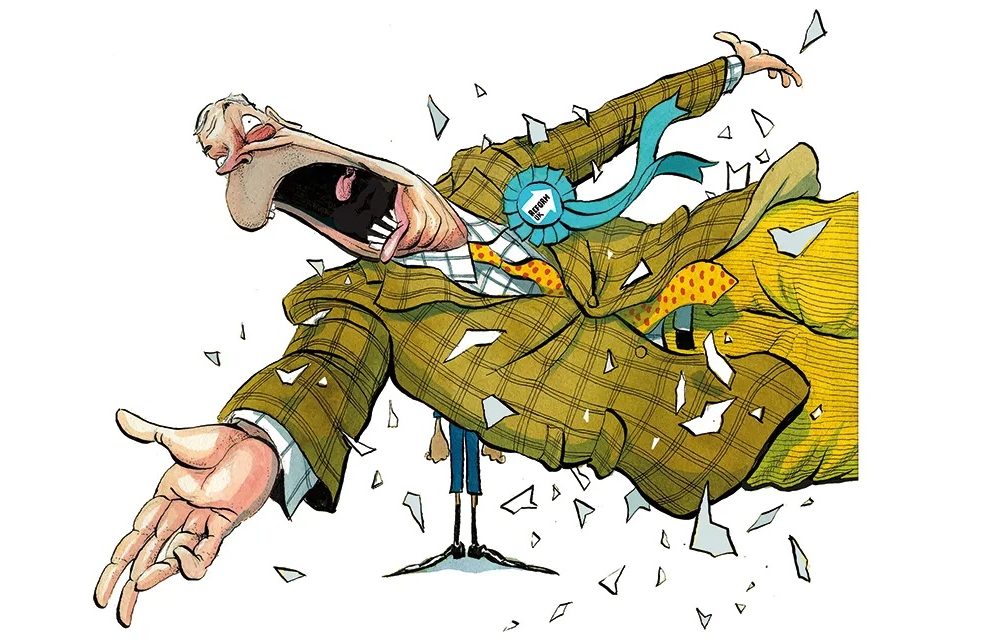Clacton-on-Sea, England
Nigel Farage had given less than a day’s notice, yet hundreds stood ready to welcome him last Tuesday morning on the pier of Clacton-on-Sea. There was a woman with Union Jack sunglasses and a man wearing an “I love gas and oil” T-shirt. More stood on the bridge above, peering down. Everyone wanted to catch sight of their would-be Member of Parliament. “I’m here to blow him a kiss and say thank you, thank you Nigel,” explains Yvonne, in her sixties. “He 100 percent has my vote.” This is a Conservative seat now but it was once a UKIP seat and these voters may well send Farage to Parliament as the new leader of Reform UK.
‘Nigel is a breath of fresh air. We need the government shaken up big time. I wasn’t going to vote but I will now’
Farage once said that the drawback to standing for Parliament was that he did not want “to spend every Friday for the next five years in Clacton.” That didn’t seem to matter to the crowd as he gave his rabble-rousing speech. “What do I have to offer you?” he asked. “Well, I can promise that I do know one thing: that a woman can’t have a penis. You won’t get any woke PC nonsense from me because I’ve always told it as it is!” Huge applause followed. Then came his plea: “Send me to Parliament to be a bloody nuisance!”
;768:[300×250,336×280,320×100];0:[300×250,320×100,320×50]”]Farage’s last-minute decision to stand, despite previously saying that he wouldn’t, is already proving a nuisance to Tory strategists. They pushed for an early election in the hope that Farage would not have time to take over as Reform UK leader. One part of the July election gamble appeared to pay off: Farage initially said the date had caught him off guard and that his focus would be on the United States. He changed his mind (“It’s allowed, you know!”) and wants to lead a realignment of the right in the United Kingdom — one that first needs the Tories to experience severe losses — and to prove that Reform has an electoral base.
Clacton is a seaside resort whose fortunes have declined in recent years and is heavily populated with Reform’s target electorate. These are the people whom Michael Gove once referred to as being “overlooked and undervalued” and, judging by the people I met there, they still feel that way eight years after the Brexit vote. “Get rid of the Tories, get rid of Labour,” said Andy, a fifty-eight-year-old retiree. “They’re doing us no good.” Net zero is on his mind and he sees both parties as culpable. “We caught the bus because we’ve just got rid of the car. We’re getting ripped off due to green taxes and ULEZ. My mates are like: ‘Now, we’ve got someone to vote for.’”
Clive, a local resident, agrees. “Nigel is a breath of fresh air. We need the government shaken up big time. I wasn’t going to vote, to be honest with you, but I will now. Otherwise it’s just a case of same old, same old.” Martin, a pensioner who volunteers with his local church, didn’t vote in 2019 but plans to vote Reform next month. “What annoys me is that Rishi Sunak’s coming out with all these policies now. They’ve had fourteen years and they haven’t done them.”
The only comfort for the Conservatives is that some Reform-minded voters are wondering if they will be useful idiots for Labour and end up increasing Keir Starmer’s majority. One resident, who works in local government and wants to remain unnamed, said that Farage will take Clacton, “But what will it do for the rest of the country? How much of this is going to give Reform a massive boost — but not enough to stop Labour taking the election? That’s my concern.”
Farage’s response is different to that of his predecessor as Reform UK leader. Richard Tice said that his objective was to destroy the Tories. When I met Farage in Wetherspoons with the press after the rally, he told me: “You will not find a single quote from me saying I want to destroy the Tories. What you will find is me saying they’ve destroyed themselves already. It’s over, it’s done — there is no election. Labour is going to win. The positive thing that I’m trying to do is provide a voice of opposition to a Labour government; it looks to me like the cabinet will be stuffed with incompetents.”
;768:[300×250,336×280,320×100];0:[300×250,320×100,320×50]”]Farage’s message is that the Tory Party is already finished: nothing can save it. So the election is a chance for voters to say where the right should go next. While Tory members think of the 1993 Canadian wipeout with horror, Farage says over a pint of bitter that he sees it as inspiration: “My aim is for the center-right of British politics to realign and it can’t do that under the current Conservative Party. There needs to be a change. If there was a model I was looking to — and it may sound ambitious — it would be Canada about thirty years ago. What I do know is that without millions of votes, without a few seats in parliament, it won’t happen.”
In Canada, a new party — also called Reform — didn’t just help to bring down the Conservatives but ended up merging with them and, in effect, taking them over. This may be Farage’s longer-term aim: not to split the right but to swallow it. That may be hard with two or three Members in Parliament.
The Conservative Party watches on in alarm. As one party figure puts it: “We are now totally, absolutely screwed.” “What a bloody disaster,” says a Tory peer. “Just when you thought it couldn’t get any worse.” Another government advisor adds: “Rishi is cursed. Plain and simple.” One minister says: “This is precisely the scenario we risked everything to avoid — but the only hope is that Farage just has four or five weeks to organize. Perhaps even he won’t be able to do it in that time.”
This may be Farage’s longer-term aim: not to split the right but to swallow it
When he announced his comeback, Farage said that last time, he took more votes from Labour than he did the Tories. But that was a different era. This time, studies show that Reform voters are overwhelmingly those who backed Boris Johnson in the 2019 “Get Brexit Done” election. The Farage effect may well be to split the right while leaving the left intact. Certainly, Labour aides sound sanguine about Reform. “They may well take some votes off us,” says one member of Starmer’s team. “But it’s a nightmare for the Tories.”
Conservatives now see this election as a mission to avoid a wipeout. The question is how they can push that narrative without conceding defeat. They hope to keep challenging Reform switchers. It was notable that Sunak used the closing statement of his first head-to-head TV debate to address the man who was not in the room — and say that a vote for anyone other than him was, in effect, a vote for Labour. On Tuesday night, there was palpable relief among Sunak’s team that snap polling suggested he had (narrowly) won the debate. “Just what we needed,” said one close aide.
;768:[300×250,336×280,320×100];0:[300×250,320×100,320×50]”]Sunak successfully blindsided Starmer by claiming that impartial civil servants had calculated that Labour would mean $2,500 more in tax per household. The truth of that claim is debatable, yet Starmer seemed to have little idea how to rebut it.
Last week, however, Farage supplanted Starmer as the man that Sunak really has to beat. He will need clear arguments. He could say, for instance, that voting Reform in this election could mean ten to fifteen years of Labour rule and a butchered, warring rump of a Conservative Party. A Labour victory may be what many Reform activists want, but is it what 2019 Tory voters want? The answer to that question could decide the future of the British right.
This article was originally published in The Spectator’s UK magazine. Subscribe to the World edition here.


























Leave a Reply